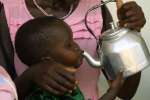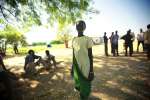- Text size
 |
|  |
|  |
| 
- Français
UNHCR survey of previously isolated IDPs in CAR finds acute hardship
Briefing Notes, 15 November 2011
This is a summary of what was said by UNHCR spokesperson Andrej Mahečić – to whom quoted text may be attributed – at the press briefing, on 15 November 2011, at the Palais des Nations in Geneva.
A UNHCR-Danish Refugee Council survey of displaced civilians near the town of Ndélé in northern Central African Republic has found acute hardship, including a high incidence of child or teenage marriage and widespread use of children as labour.
The survey covered 300 families from a population of 17,000 people in the area. One in five families reported having lost at least one family member during the first half of 2011 to insecurity, a lack of health services, or shortages of food. Among children between the ages of six and fifteen, 32.5 percent were being used as child labour.
Among girls between the ages of 12 and 17, thirty percent had been sold into marriage. IDP families told UNHCR that they married their underage daughters to members of the host communities and sent children to farm and fish for these communities in exchange for housing, food or money. UNHCR staff also received reports of gang rape by armed groups.
The survey was carried out mainly between May and September, and will be extended to more villages in the region. Displaced people in the area had almost no access to humanitarian help before June this year when a ceasefire was signed between rebels of the Patriots' Convention for Justice and Peace – one of the main rebel factions in the area – and the CAR Government. Before the peace agreement, the only civilians able to benefit from humanitarian assistance were those who managed to reach Ndélé town.
UNHCR hopes that the improved security will allow for a strengthened UNHCR presence in this part of the CAR to respond to the protection and assistance needs of the displaced populations. So far, UNHCR staff have been conducting missions to the area from our office of in Kaga Bandoro, 350 kilometers further southwest. The journey to Ndélé takes around 11 hours, contributing to difficulties in delivering aid.
Ndélé is located in the prefecture of Bamingui Bangoran, around 700 km from Bangui, the CAR capital. It was once considered the country's breadbasket, but due to the multitude of rebel groups and armed banditry since 2005, many of its residents have been reduced to living in the bush, unable to do farming.
In CAR, UNHCR assists more than 176.000 IDPs and some 20.000 refugees mainly from Sudan's Darfur region and the Democratic Republic of Congo.
For further information on this topic, please contact:
- In Bangui, CAR: Djerassem Mbaiorem on mobile +236 72 22 3511
- In Geneva: Fatoumata Lejeune-Kaba on mobile +41 79 249 3483

















































